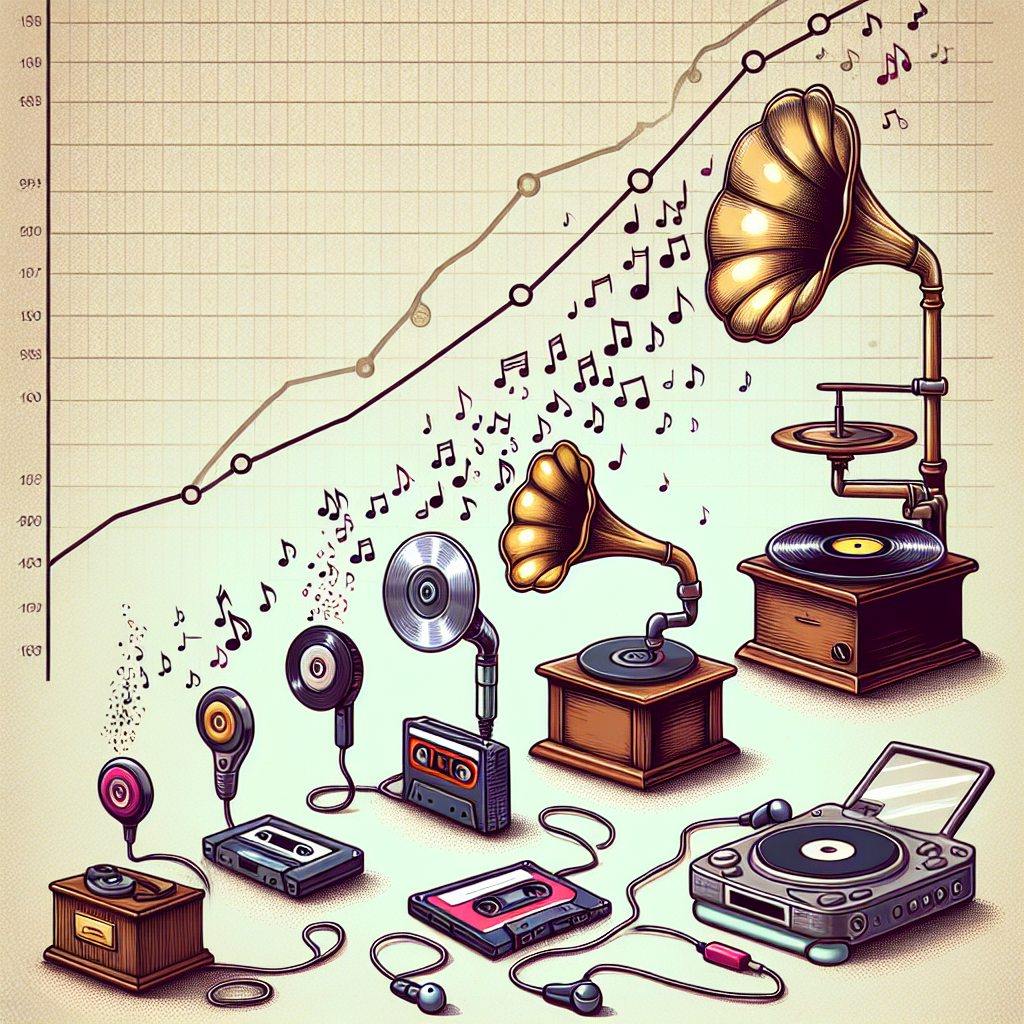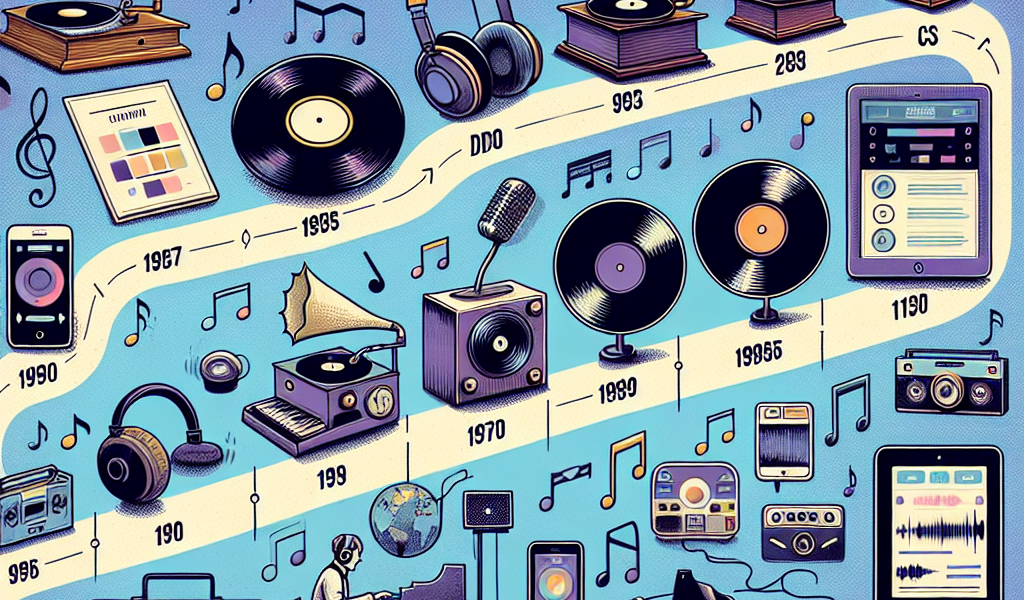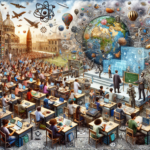-
Table of Contents
“Revolutionizing Sound: How Technology Transforms the Music Industry”
Introduction

The impact of technology on the music industry has been profound and transformative, reshaping how music is created, distributed, and consumed. From the advent of digital recording and production tools to the rise of streaming platforms, technology has democratized music creation, allowing artists to produce high-quality recordings from home studios. The internet has revolutionized distribution, enabling musicians to reach global audiences without the need for traditional record labels. Streaming services have changed the economic landscape, shifting revenue models and influencing how artists monetize their work. Additionally, social media and digital marketing have provided new avenues for promotion and fan engagement. Overall, technology has both challenged and expanded the possibilities within the music industry, fostering innovation while also presenting new challenges for artists and industry professionals.
Evolution Of Music Production: How Technology Has Transformed Recording Studios
The music industry has undergone a seismic shift over the past few decades, largely due to the rapid advancements in technology. This transformation is perhaps most evident in the evolution of music production and the way recording studios operate. Gone are the days when musicians and producers were confined to large, expensive studios filled with bulky equipment. Today, technology has democratized music production, making it more accessible and versatile than ever before.
In the early days of recording, studios were equipped with analog tape machines, large mixing consoles, and a plethora of outboard gear. These setups required significant financial investment and technical expertise, often limiting high-quality production to well-funded artists and record labels. However, the advent of digital technology in the late 20th century began to change this landscape dramatically. Digital Audio Workstations (DAWs) like Pro Tools, Logic Pro, and Ableton Live have revolutionized the way music is recorded, edited, and produced. These software programs offer a level of precision and flexibility that was unimaginable with analog equipment.
Moreover, the rise of affordable, high-quality audio interfaces and microphones has further lowered the barrier to entry. Musicians can now set up a home studio with a relatively modest budget, enabling them to produce professional-grade recordings without ever stepping foot in a traditional studio. This shift has empowered a new generation of independent artists, allowing them to create and distribute music on their own terms.
In addition to making music production more accessible, technology has also expanded the creative possibilities available to artists and producers. Virtual instruments and plugins offer an almost limitless array of sounds and effects, enabling musicians to experiment in ways that were previously impossible. For instance, a producer can now emulate the sound of a grand piano, a vintage synthesizer, or even an entire orchestra with just a few clicks. This has led to a more diverse and innovative musical landscape, as artists are no longer constrained by the limitations of physical instruments.
Furthermore, advancements in technology have streamlined the collaborative process. Cloud-based platforms and file-sharing services allow musicians and producers to work together from different corners of the globe. This has not only broadened the scope of potential collaborations but also accelerated the pace at which music can be created and released. In an industry where timing can be crucial, this increased efficiency is a significant advantage.
However, it’s important to acknowledge that these technological advancements have also introduced new challenges. The ease of access to music production tools has led to an oversaturated market, making it more difficult for artists to stand out. Additionally, the shift towards digital production has sparked debates about the loss of analog warmth and the potential for over-reliance on technology at the expense of musicianship.
Despite these challenges, the overall impact of technology on music production has been overwhelmingly positive. It has democratized the industry, expanded creative possibilities, and facilitated global collaboration. As technology continues to evolve, it will undoubtedly bring about further changes, pushing the boundaries of what is possible in music production. For now, musicians and producers can revel in the newfound freedom and opportunities that technology has afforded them, transforming recording studios from exclusive sanctuaries into accessible playgrounds for creativity.
Streaming Services: Revolutionizing Music Consumption And Distribution
The music industry has undergone a seismic shift over the past two decades, largely driven by the advent of technology. Among the most transformative developments has been the rise of streaming services, which have revolutionized both music consumption and distribution. This change has not only altered how listeners access their favorite tunes but has also reshaped the entire landscape of the music business.
Initially, the music industry was dominated by physical sales, with vinyl records, cassettes, and CDs being the primary mediums. However, the digital age ushered in a new era, beginning with the introduction of MP3s and file-sharing platforms like Napster. While these early digital formats disrupted traditional sales models, they also paved the way for more sophisticated solutions. Enter streaming services such as Spotify, Apple Music, and Tidal, which have since become the cornerstone of modern music consumption.
One of the most significant impacts of streaming services is the sheer convenience they offer. Gone are the days when listeners had to purchase entire albums or wait for their favorite songs to play on the radio. With a few taps on a smartphone, users can now access millions of tracks instantly. This ease of access has democratized music consumption, allowing people from all walks of life to explore a vast array of genres and artists. Moreover, personalized playlists and algorithm-driven recommendations have made discovering new music an effortless and enjoyable experience.
In addition to transforming how people listen to music, streaming services have also revolutionized its distribution. For artists, especially independent ones, these platforms provide an unprecedented opportunity to reach a global audience without the need for a traditional record label. Uploading music to streaming services is relatively straightforward, and the potential for virality means that even unknown artists can achieve overnight success. This shift has leveled the playing field, enabling a more diverse range of voices to be heard.
However, the rise of streaming services has not been without controversy. One of the most contentious issues is the compensation model for artists. While streaming platforms generate substantial revenue, the payout per stream to artists is often criticized as being insufficient. Many musicians argue that the current model disproportionately benefits major labels and top-tier artists, leaving smaller, independent musicians struggling to make a living. This has sparked ongoing debates about the need for more equitable revenue-sharing practices within the industry.
Despite these challenges, the benefits of streaming services are undeniable. For consumers, the ability to access a virtually limitless library of music for a relatively low monthly fee is a game-changer. For artists, the potential for global exposure and the ability to connect directly with fans through these platforms offer new avenues for growth and engagement. Additionally, the data generated by streaming services provides valuable insights into listener preferences, helping artists and labels make more informed decisions about marketing and production.
As technology continues to evolve, so too will the music industry. The integration of artificial intelligence, virtual reality, and blockchain technology promises to bring even more innovation to the way music is consumed and distributed. While it is difficult to predict exactly what the future holds, one thing is certain: streaming services have already left an indelible mark on the music industry, fundamentally changing the way we experience and interact with music. As we move forward, it will be fascinating to see how these platforms continue to shape the soundscape of our lives.
The Role Of Artificial Intelligence In Shaping The Future Of Music Creation
Artificial intelligence (AI) is revolutionizing various sectors, and the music industry is no exception. As technology continues to evolve, AI is playing an increasingly significant role in shaping the future of music creation. This transformation is not only altering how music is produced but also how it is consumed and appreciated by audiences worldwide.
To begin with, AI has made significant strides in music composition. Algorithms can now analyze vast amounts of musical data to generate new compositions that mimic the styles of various artists and genres. For instance, platforms like OpenAI’s MuseNet can create original pieces of music by learning from a diverse range of musical influences. This capability allows musicians to experiment with new sounds and styles, pushing the boundaries of creativity. Moreover, AI-generated music can serve as a valuable tool for artists experiencing writer’s block, providing a fresh source of inspiration.
In addition to composition, AI is also transforming the way music is produced. Advanced software can now assist in mixing and mastering tracks, tasks that traditionally required a trained ear and years of experience. AI-driven tools can analyze a song’s structure and suggest optimal adjustments to enhance its quality. This democratization of music production means that aspiring musicians with limited resources can produce professional-sounding tracks from the comfort of their homes. Consequently, the barrier to entry in the music industry is lower than ever before, fostering a more diverse and inclusive musical landscape.
Furthermore, AI is enhancing the listening experience for audiences. Streaming services like Spotify and Apple Music use sophisticated algorithms to analyze user preferences and recommend personalized playlists. These recommendations are not just based on genre or artist but also on more nuanced factors such as tempo, mood, and even the time of day. This level of personalization ensures that listeners are continually discovering new music that resonates with their tastes, thereby increasing engagement and satisfaction.
Transitioning from the consumer side to the business aspect, AI is also proving to be a game-changer in music marketing and distribution. Predictive analytics can forecast trends and identify potential hits before they become mainstream. This allows record labels and artists to make more informed decisions about which songs to promote and how to allocate their marketing budgets effectively. Additionally, AI can analyze social media interactions and streaming data to gauge public sentiment, providing real-time feedback that can be invaluable for marketing strategies.
However, the integration of AI in music creation is not without its challenges. One of the primary concerns is the question of originality and authenticity. Critics argue that AI-generated music lacks the emotional depth and personal touch that human composers bring to their work. There is also the issue of intellectual property rights, as it becomes increasingly difficult to determine ownership of AI-created compositions. These ethical and legal dilemmas will need to be addressed as AI continues to permeate the music industry.
Despite these challenges, the potential benefits of AI in music creation are undeniable. By automating routine tasks and providing new avenues for creativity, AI is empowering artists to focus more on their artistic vision. As technology continues to advance, it is likely that AI will become an even more integral part of the music creation process, opening up exciting possibilities for both artists and audiences alike.
In conclusion, the role of artificial intelligence in shaping the future of music creation is multifaceted and profound. From composition and production to marketing and distribution, AI is transforming every aspect of the music industry. While there are challenges to navigate, the potential for innovation and creativity is immense, promising a future where technology and artistry coexist harmoniously.
Conclusion
The impact of technology on the music industry has been profound and multifaceted, revolutionizing the way music is produced, distributed, and consumed. Advances in digital recording and production tools have democratized music creation, allowing artists to produce high-quality tracks from home studios. The rise of streaming platforms has transformed music distribution, making it easier for artists to reach global audiences while also altering revenue models. Social media and digital marketing have provided new avenues for promotion and fan engagement, further changing the landscape of the industry. However, these technological advancements have also introduced challenges, such as issues related to copyright, fair compensation for artists, and the oversaturation of the market. Overall, technology has reshaped the music industry, offering both opportunities and challenges that continue to evolve.





